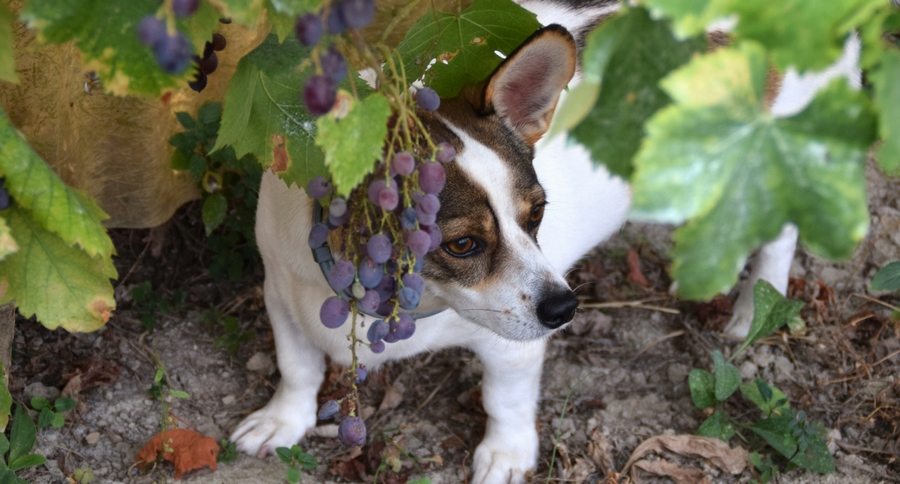Grape and raisin toxicity in dogs is something every pet owner should have on their radar these days. How many grapes are enough to cause renal failure?
Twenty years ago we used to use grapes and raisins as a training treat! And the toxic principle is STILL unknown. So far the majority of toxicosis reports have been in dogs.
This remains one of the biggest unknowns when it comes to poisonous human foods for dogs. All grape varieties have been implicated. Raisins are usually made from white seedless grapes, but all raisins should be considered toxic. One small box of raisins is enough to kill your dog.
According to a Toxicology Brief in Veterinary Technician:
"Between January 2001 and August 2004, over 200 calls were made to the ASPCA Animal Poison Control Center involving potential exposures to grapes or raisins in dogs. Sensitive dogs have a risk of initial gastrointestinal upset followed by acute renal failure (ARF)."

What's the Toxic Dose?
The minimum toxic dose is approximately 1 grape per pound of body weight. Raisins, having lost their water content, are considered more toxic at 6 raisins per kg of body weight, or 2-3 raisins per pound of body weight. You should treat this as a medical emergency if you suspect your dog consumed grapes or raisins. Call your vet immediately as they may ask you to induce vomiting in the affected dog.
Clinical Signs
Signs of acute kidney failure include nausea, lack of appetite, vomiting, diarrhea, abdominal pain, excessive thirst, and excessive urination. You should also be aware of the earlier potential signs:
- Vomiting and/or diarrhea - within a few hours of ingestion.
- Loss of appetite
- Lethargy
- Abdominal pain
- Dehydration
- Oliguria (passing only a small amount of urine)
- Anuria (complete cessation of urine)
- Tremors
- Seizures
Diagnosis Is Similar to Kidney Failure
Since the diagnosis is so close to kidney failure, your veterinarian will immediately perform diagnostic tests including a complete blood count (CBC) and a urinalysis to assess the amount of damage to the kidneys.
Get Your Dog to the Vet for Immediate Treatment!
As reported in the Merck Veterinary Manual (MVM):
"Emesis (vomiting) may be induced with 3% hydrogen peroxide (2 mL/kg; no more than 45 mL), followed by activated charcoal. With large ingestions or in cases in which vomiting and/or diarrhea has spontaneously developed within 12 hr of ingestion of grapes or raisins, aggressive fluid diuresis for a minimum of 48 hr is recommended."
Drugs including dopamine and furosemide are used to help with the kidney damage.
https://www.youtube.com/watch?v=I6Qjd8hgAtI
Controversy About Raisin Toxicity
Dr. Karen Becker explores if we should start testing dogs with raisin toxicity for elevates levels of fluoride. Many feel the toxic agent and raisin and grape toxicity is still unknown.
"This testing should help determine if a dog is suffering from fluoride toxicity rather than raisin toxicity. As for raisins and grapes, wild dogs such as coyotes and wolves have been known to forage on grapes. In fact, in some parts of the world they eat them regularly and don't seem to develop acute renal failure."
Were you aware that grapes and raisins were toxic to dogs? Have you ever had to run your dog to the emergency vet hospital because they ate a box of raisins? Please leave your answer in the comments below!
WATCH NOW: People are Poisoning Dogs




